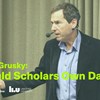neoliberal
David Grusky: Should scholars own data? The high cost of neoliberal qualitative scholarship
Welcome to this seminar with David Grusky, Professor of Sociology at Stanford University.The seminar is jointly organized by the Institute for Analytical Sociology and the Institute for Futures Studies.D Thursday, October 6 13:00-15:00 (CET) At the Institute for Futures Studies (Holländargatan 13, Stockholm), or onlineIf qualitative work were to be rebuilt around open science principles of transparency and reproducibility, what types of institutional reforms are needed? It’s not enough to mimic open science movements within the quantitative field by focusing on problems of data archiving and reanalysis. The more fundamental problem is a legal-institutional one: The field has cut off the development of transparent, reproducible, and cumulative qualitative research by betting on a legal-institutional model in which qualitative scholars are incentivized to collect data by giving them ownership rights over them. This neoliberal model of privatized qualitative research has cut off the development of public-use data sets of the sort that have long been available for quantitative data. If a public-use form of qualitative research were supported, it would not only make qualitative research more open (i.e., transparent, reproducible, cumulative) but would also expand its reach by supporting new uses. The American Voices Project – the first nationally-representative open qualitative data set in the US – is a radical test of this hypothesis. It is currently being used to validate (or challenge!) some of the most famous findings coming out of conventional “closed” qualitative research, to serve as an “early warning system” to detect new crises and developments in the U.S., to build new approaches to taking on poverty, the racial wealth gap, and other inequities, and to monitor public opinion in ways far more revealing than conventional forced-choice surveys. The purpose of this talk is to discuss the promise – and pitfalls – of this new open-science form of qualitative research as well as opportunities to institutionalize it across the world.
Erez Maggor: Bidenomics, Industrial Policy, and the Twenty-First Century American Developmental State
Venue: Holländargatan 13, Stockholm Research seminar with Erez Maggor, Assistant Professor at Ben-Gurion University. He studies the political economy of industrial policy and innovation. Register here &
Thomas Hylland Eriksen: Overheating
Overheating. Understanding accelerated change. Thomas Hylland Eriksen, professor at the Department of Social Anthropology, University of Oslo. ABSTRACTThe contemporary world is … too full? Too intense? All of the above, and more. Ours is a world of high-speed modernity where exponential growth can be found in domains as different as the number of cellphones in Africa and the number of international tourist arrivals. The fossil fuel revolution two centuries ago led to the contemporary ‘overheated’ world of exponential growth. The main dilemma of this overheated world is the insight that what was the salvation for humanity for two hundred years, namely fossil fuels, has rapidly become our damnation owing to climate change. This lecture outlines the parameters of ‘overheating’ and describes the main global challenges for our century.
AI Policy for Whom? Reclaiming Governance from Capitalist Capture
Proceedings of the Eigth AAI/ACM Conference on AI, Ethics, and Society (2025). Abstract Contemporary AI policy is dominated by hegemonic neoliberal ideology, embedding assumptions of individualism, ratio
Jason Beckfield: Unequal Europe: Regional Integration and the Rise of European Inequality
Jason Beckfield, Professor of Sociology at Harvard University. Abstract The Euro-crisis of 2009–2012 and the UK’s 2016 vote to leave the EU vividly demonstrated that EU policies matter for the distribut

Should Scholars Own Data? David Grusky About the American Voices Project
If qualitative work were to be rebuilt around open science principles of transparency and reproducibility, what types of institutional reforms are needed? It’s not enough to mimic open science movemen
Urban Futures from Essentials to Experiences - The transformative role of marketplaces in 21st century cities
Place: The Institute for Futures Studies, Holländargatan 13, StockholmRegister hereInformality is on the rise. From remote labour and services-on-demand to food trucks and pop-up shops, its transformat
Thomas Sommer-Houdeville: Remaking Iraq
- Neoliberalism and a System of violence after the US invasion, 2003-2011 Dr Thomas Sommer-Houdeville, Stockholm University, Department of Sociology. ABSTRACT After the invasion of Iraq and the destructi








